Ready to hit the open road? Whether you’re dreaming of starlit desert nights or misty mountain mornings, your first motorhome adventure awaits. But before you turn that key, make sure you have everything you need to transform your home on wheels into a comfortable basecamp for exploration. This guide covers all the motorhome essentials that seasoned RVers wish they’d known about from day one.
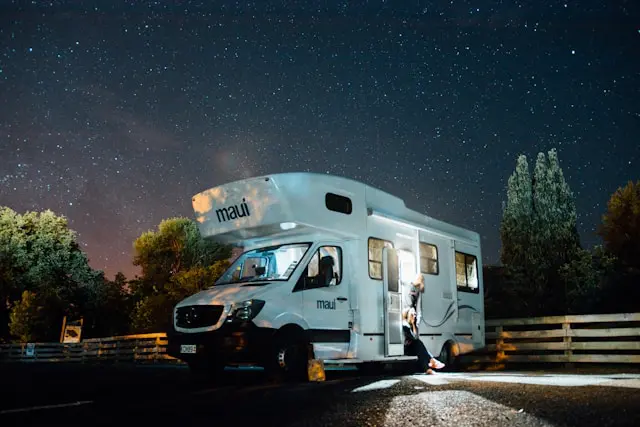
Safety | Basics | Comfort and Convenience | Outdoor Items | Tech | Personal Hygiene | Kitchen | Power Options | Wrapping Up
Essential Safety Gear for Your RV
- First Aid Kit: Bring a well-stocked first aid kit. Also bring personal medications.
- Fire Extinguisher: Ensure it is easily accessible and regularly checked.
- Carbon Monoxide, Smoke, and Propane Detectors: Note that smoke will gather near the ceiling, carbon monoxide will disperse throughout the room, and propane will collect near the floor, so plug in the detectors accordingly. We bought two different brands for peace of mind.
- Roadside Emergency Kit: A roadside emergency kit is essential. Include items like reflective triangles, flares, jumper cables, and a tire pressure gauge.
- Weather Radio: Stay informed about weather conditions and emergency alerts with a weather radio. At minimum, keep an old-fashioned AM/FM radio in case the internet goes down.
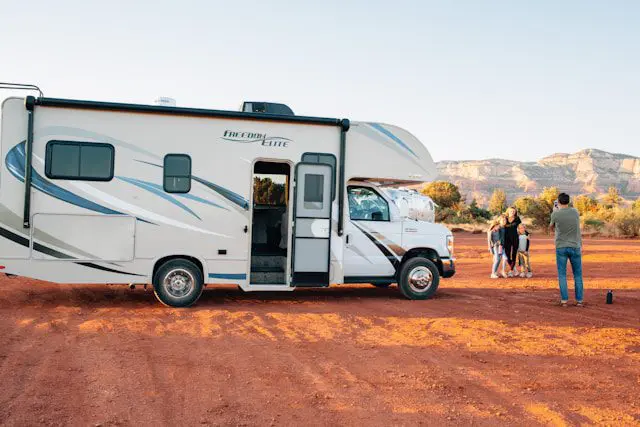
Basic Motorhome Essentials
- Basic Tool Kit: Bring a tool kit containing wrenches, screwdrivers, pliers, and utility knives. Store these in an easy-to-access location.
- Duct Tape and Zip Ties: Duct tape and zip ties are indispensable for stop-gap measures to fix leaks, secure loose items, and handle repairs.
- Portable Tire Inflator: The Bullseye Air Inflator is durable, has a tire pressure readout, and will stop inflating when the set tire pressure is achieved.
- Spare Tire: Make sure the spare is in good condition, inflated, and you know how to replace it.
- Jack: We like bottle jacks for their compact size and portability.
- 120V Extension Cords: We use ours mainly to connect our Starlink internet satellite.
- 30A and 50A Extension Cords: You will need these to connect to shore power. Find an extension cord that is long enough to reach the shore power without being too cumbersome. I use a 30-foot cord as my primary and stow a backup 20-foot cord.
- Surge Protector: Protect your electrical system from power surges. We love our Progressive Industries model because it has lights to quickly alert to any issues with the shore power.
- 30/50A Adapters: Connect your 50A rig to 30A power pedestals and vice versa. They are cheap and easily found.
- Leveling Blocks: If your motorhome doesn’t have automatic leveling, RV levelers can be had for relatively cheap.
- Freshwater Hose: Make sure to get a drinking-water rated, lead-free hose. We like the Zero-G kink-free hose because it shrinks down to a compact size.
- Water Filter: Cheap and easily found at Walmart and hardware stores.
- Water Pressure Regulator: This is a must-have. The Camco model automatically adjusts to the ideal RV water pressure to save you time.
- Sewer Hose: These are relatively cheap and easy to find. You will also need an extension hose for sites with hard-to-reach receptacles.
Motorhome Essentials: Comfort and Convenience
- Comfortable Mattress: Your motorhome’s “queen”- or “king”-sized bedframe might be smaller than a standard-size mattress. Plan accordingly. Memory foam mattresses are more receptive to vacuum-sealing, more portable, and arguably more comfortable. We went with Casper’s foam mattress and love it.
- Handheld Vacuum: Pet hair and dirt will find its way into your RV’s nooks and crannies and a portable handheld vacuum is a must-have.
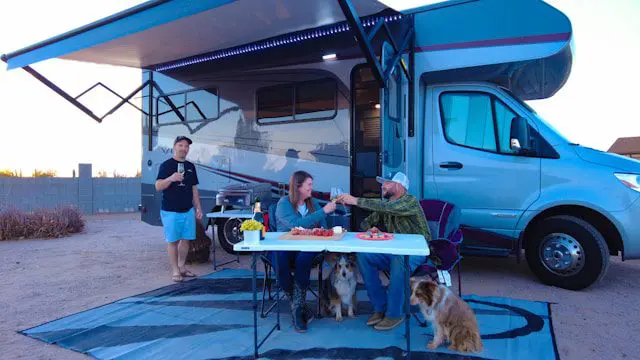
Outdoor Motorhome Essentials
- Folding Chairs: I tried a few models and settled on Tommy Bahama because it takes up less room, is more comfortable, and provides easier access for my dog to snuggle.
- Outdoor Rug: Waterproof rugs are essential to keep you and your pet from the dirt, rocks, and creepy crawlies found in most campsites.
- Tables: Most RV parks and campgrounds will supply picnic tables at your site. You can probably get away without one.
- Insect Repellent: I love the Thermacell Mosquito Repeller. It creates a strong 20-foot zone of protection around your campsite, eliminating the need for bug spray. They also make portable options you can clip on.
Motorhome Essentials: Tech
- RV Travel Apps: Use apps designed for RVers to find campgrounds, plan routes, track expenses, and more. We’ve tried a few and like The Dyrt for its accuracy and ability to filter on dump stations, water, and free overnight RV parking. The yearly subscription is $36, but it is cheaper and better than other options.
- Portable Wi-Fi: RV campground wi-fi is hit or miss, usually miss. I used wi-fi extenders and my phone’s mobile hotspot for a while but eventually got tired of the hastle and ended up paying for Starlink internet service. The satellite cost me about $500 with tax and the unlimited data service is $165/month, but the performance and convenience has been worth it.
- GPS Navigation System: I typically go with my phone’s navigation since my rig is usually well-under overpass height restrictions, but I’ve been around much taller motorhomes that do need to be more diligent in route planning. This Garmin navigator will create RV-friendly routes to avoid low overpasses and comes with all the bells and whistles you would expect from a dedicated navigator, like a 7-inch touchscreen, built-in dash cam, RV parks database, and voice recognition.
- Backup Camera: These are handy for connecting your hitch when towing a vehicle or trailer and for other maneuvering in blind spots. We like the iBall Wireless Camera because of its magnetic mount, LCD display, and low price.
- Portable Brake Controller: If your rig is a travel trailer or 5th wheel and you need a brake controller, I highly recommend the Curt model. It offers a simple plug-and-play installation into the 7-way blade socket on your truck and connects via an app on your smartphone. Make sure to use zip ties when connecting it to your truck’s 7-pin connection for extra security.
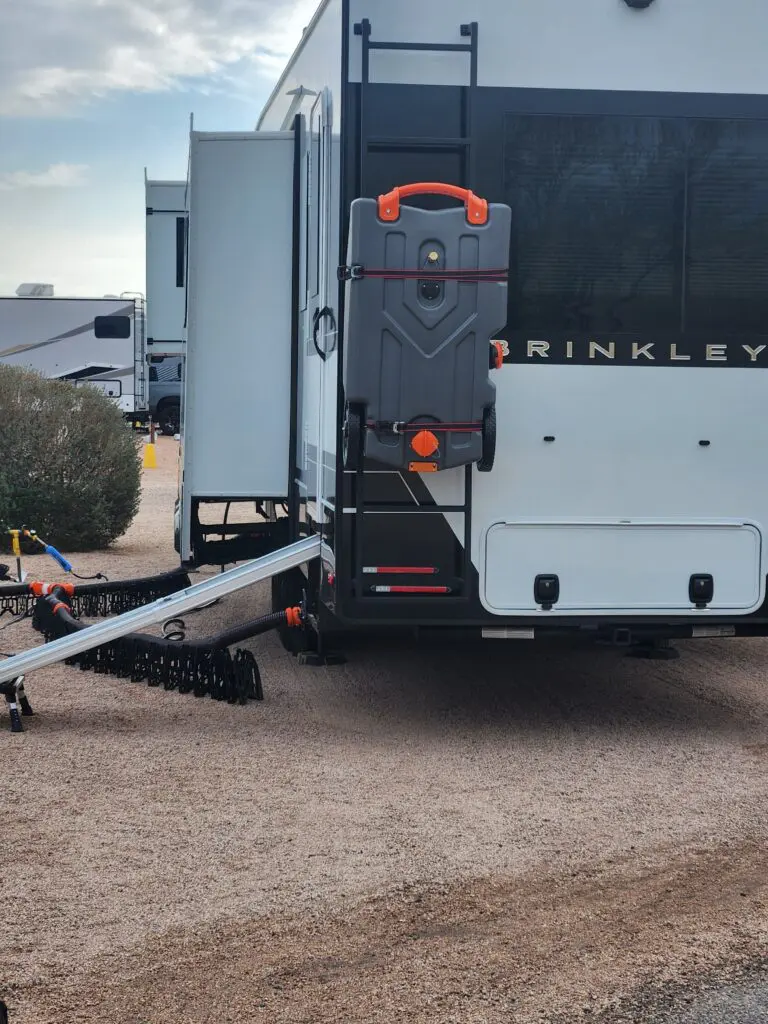
Personal Care and Hygiene Essentials
- RV-Compatible Toilet Paper: RV-specific toilet paper breaks down quickly and prevents clogs in your motorhome’s waste system. The extra pennies you spend on this will save you from clogged black water plumbing.
- Cleaning Supplies: Mix one part vinegar with one part water in a spray bottle and use this for cleaning. RV plumbing is not designed to handle abrasive cleaning products.
- Portable Waste Tank: Empty your motorhome’s black water tank without needing to move the entire rig. The Camco Rhino tanks are a popular choice.
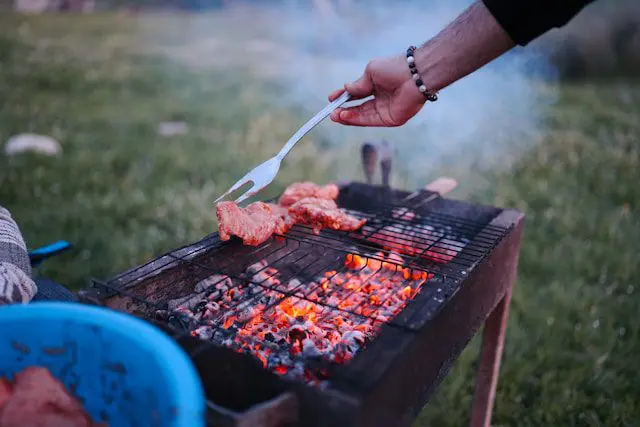
Motorhome Essentials: Kitchen
- Oven: We tried using the propane oven that came with our rig, but it didn’t maintain consistent temperature. We bought a Ninja all-in-one convection oven and air fryer and haven’t looked back.
- Cooking Equipment: A compact set of pots, pans, utensils. Look for space-saving options for your rig. Paper plates and plastic cutlery save time on dishes.
- Grill: A portable grill is a must-have for most campers. Look for one that will work with the compact propane tanks.
Power Options: Understanding Your Motorhome’s Generator
Most motorhomes include built-in generators that run off the main fuel tank or propane system. Here’s what you need to know:
Built-in Benefits:
- Integrated fuel supply
- Automatic transfer switch
- Powers entire electrical system
- Controlled from inside
When to Consider a Portable:
- Backup power redundancy
- Extra capacity for high-draw situations
- Boondocking beyond built-in generator capacity
- If your built-in unit needs repair
Recommendation: Before buying a portable generator, test your built-in unit’s capacity during typical use. Most factory-installed generators handle standard power needs, including one AC unit and basic appliances.
I went with the Westinghouse iGen4500DFc Remote Start:
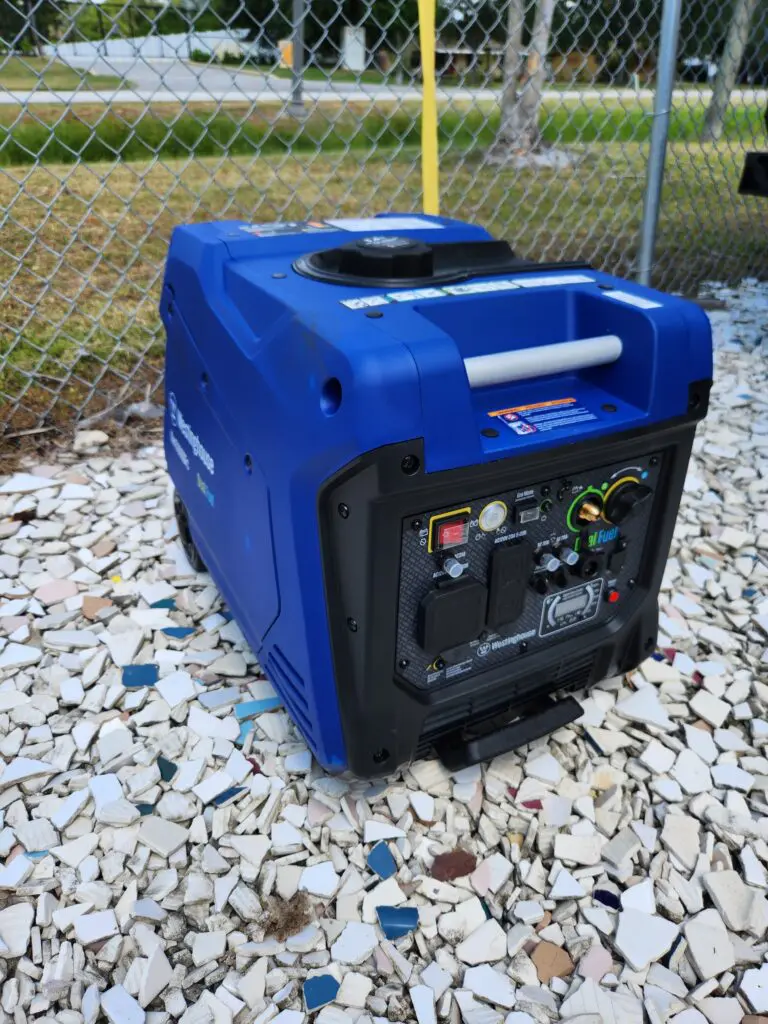
- Powers both 30A and 50A motorhomes (with adapter)
- Runs on gas or propane
- Quiet operation at 52 decibels
- Manageable weight at 105 lbs
- Expandable power through daisy-chaining
- Handles one AC unit plus standard appliances
Ready for Your Motorhome Adventure?
Get rolling with confidence knowing you’ve got motorhome essentials covered. For weekly tips on motorhome living and gear recommendations, join our Gorilla Gazette community below. Safe travels!
Share Your Experience
- What are your motorhome essentials?
- When did your generator come in handy?
- Which backup power solution works best for your setup?
Drop a comment below.
More from Bananomad
- Read more about RV maintenance in our guide.
- See our guide to comprehensive vet care advice for traveling pet owners.
- Mushrooms are more than just pizza toppings. Learn about 10 healthy mushrooms and ways to add more of them to your diet.


Leave a Reply